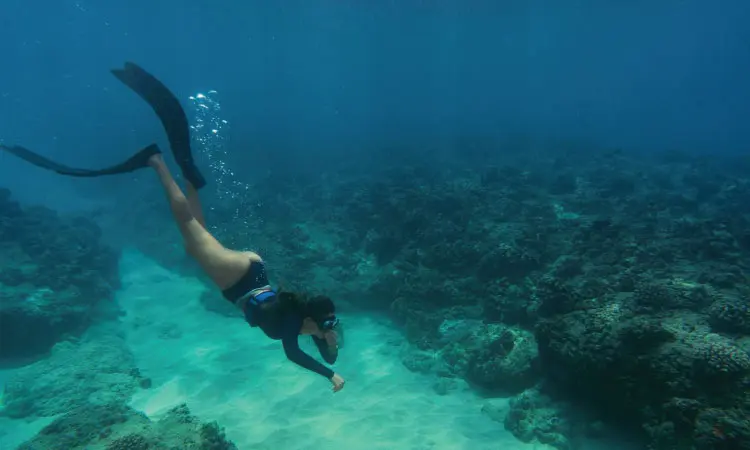Scuba diving is an exhilarating and adventurous activity that offers individuals the opportunity to explore the captivating underwater world. Many pregnant women find soaking in water to be a pleasant experience that helps alleviate the stresses of pregnancy. Scuba diving, on the other hand, is not the same as surface swimming.
When swimming, there is no increase in pressure on the water’s surface. This isn’t the case with scuba diving, though. Are you curious about the safety of scuba diving during pregnancy? This blog delves into the safety considerations and potential risks of scuba diving during pregnancy.
Scuba Diving During Pregnancy – Is It Safe?s
The incidence of scuba diving during pregnancy has increased due to a significant growth in the number of young females who are attracted to the sport of diving. There have been no human tests conducted to determine the impact of diving on a fetus, and medical research on this subject is limited.
Understandably, not many expectant mothers are willing to volunteer as test subjects. However, the available human research, along with research conducted on sheep (which have a placenta similar to humans), indicates that scuba diving can potentially harm the developing child and increase the risk of miscarriage or birth defects.
Therefore, expectant mothers are advised to avoid scuba diving during pregnancy’s first trimester.
Many diving enthusiasts consider scuba diving during pregnancy’s second trimester, as it is often referred to as the honeymoon phase of pregnancy. But unfortunately, that is not the reality.
Related Reading: Can A Pregnant Woman Swim In A Chlorine Pool
When going scuba diving, the pressure of the water is one of the most significant aspects to take into consideration.
Calculate Due Date With LMP
As one goes deeper into the water, the pressure exerted on them rises. This is because water is much denser than air, and the weight of the water above creates pressure1. This pressure can affect the body in various ways.
For instance, diving pressure can compress the lungs, making breathing difficult. The water pressure may also cause pain and discomfort in the body’s tissues and organs. Women who dive had a 5.5% higher rate of birth defects than non-diving mothers, according to a source.
During pregnancy, the body experiences numerous changes that can impact its response to pressure. Because of the baby’s added weight, a woman may find it more difficult to maintain her buoyancy while scuba diving.
Changes in hormone levels also impact how the body responds to external pressure changes during pregnancy. Due to these concerns, scuba diving is typically not advised during pregnancy2.
Related Reading: 13 Common Pregnancy Myths Busted
Benefits Of Being In Water When Pregnant
As was mentioned above, there are a lot of safety and risk concerns when it comes to scuba diving during pregnancy.
Still, some may believe that there are benefits to scuba diving while pregnant, particularly for those who are passionate about the sport and do not want to give it up. When deciding to go diving while pregnant, it is crucial to understand that we should carefully weigh the known safety risks against any potential benefits.
Before making any such choices during pregnancy, one should consult with their doctor and a diving professional.
Here are some potential advantages that people might think they can get:
- For some people, going scuba diving is a great way to unwind and forget about their stresses for a while. For general well-being during pregnancy, stress reduction can be beneficial.
- Swimming and mastering your buoyancy through scuba diving are great ways to keep up with, or even improve, your fitness levels while pregnant.
- Being underwater, seeing marine life, and feeling buoyant can boost mental health.
- Scuba diving is a great way to meet new people. The pregnant woman’s dive buddies and the diving community can make her feel more at ease.
Related Reading: 9 Problems Lack Of Exercise During Pregnancy Can Cause
You can see that none of these benefits are worth the risk. Keep in mind that while moderate exercise is safe and beneficial during pregnancy, strenuous exercise should be avoided. When weighing the possible advantages, it is important to consider the serious health and safety risks associated with scuba diving during pregnancy.
Anyone who wants to go scuba diving while pregnant needs to carefully consider all the possible risks and the way their pregnancy is going. Miscarriage, premature delivery, and congenital abnormalities are all risks that must be considered before making a decision.
Risks Associated With Scuba Diving During Pregnancy
Going scuba diving during pregnancy carries risks for the mother as well as the unborn child. Following are some of the top risks associated with scuba diving during pregnancy:
- The pressure changes experienced while scuba diving can lead to premature birth, fetal distress, or even fetal death.
- Diving has been linked to decompression sickness, a condition where nitrogen bubbles form in the blood. Decompression illness may pose a risk to the developing fetus. The fetus’s lungs cannot filter nitrogen because they won’t begin to work until afterbirth. The fetus will not be able to release these nitrogen bubbles if the mother gets decompression illness and passes it on to the fetus. Thus, even scuba diving during pregnancy’s third trimester can have bad consequences.
- Fetal death and other pregnancy complications have been linked to gas embolisms, which can occur during scuba diving. Lungs that are healthy and working properly are very good at filtering out air bubbles from the bloodstream. However, in the developing embryo, the placenta takes over the lungs in terms of gas exchange. Thus, pulmonary filtration of bubbles does not occur within the fetus. The risk of arterial gas embolism (AGE), which can be fatal, may increase as a result of this3.
Note*: An arterial gas embolism occurs when gas bubbles are introduced directly into the arterial circulation, whereas decompression sickness is a disease where gas bubbles form in tissues and venous blood4.
- The increased pressure underwater can affect the body’s oxygen concentration. Fetal hypoxia, a disorder in which the fetus does not receive enough oxygen, can result from this. Babies may experience developmental delays or other issues as a result of this disorder.
- Diving carries the risk of carbon monoxide poisoning5. When dissolved in the mother’s plasma, carbon monoxide passively passes through the placenta and attaches itself to the fetal hemoglobin. When pregnant women are exposed to carbon monoxide, it can do a lot of harm, ranging from intrauterine hypoxia to major brain damage and fetal death6.
Related Reading: Pregnancy Fitness: The Do’s and Don’ts of Cycling for Expecting Moms
How Long After Pregnancy Can You Scuba Dive?
How long a woman should wait to go scuba diving again after giving birth varies from person to person. Several factors come into play, including the new mother’s overall health and the type of labor and delivery she experienced.
The good news is that diving is safe for breastfeeding mothers. Since nitrogen does not build up in breast milk, there is no chance that the baby will absorb dissolved nitrogen from breastfeeding7.
Most of the time, women who have had a normal birth shouldn’t go scuba diving for at least four weeks after the birth. It might take longer for women who have had a cesarean section.
Most women, though, can go back to diving in about 21 days if they had a normal vaginal birth with no problems, or in 8 to 12 weeks if they had a normal cesarean section with no complications8.
How Deep Can You Dive While Pregnant?
There is no specific depth that can be considered safe during pregnancy. Dive injuries like pulmonary barotrauma and arterial gas embolism (AGE) have been reported in as little as four feet (1.2 meters) of water.
So, to protect the health and safety of both the mother and the developing baby, it is suggested that women do not go scuba diving until after giving birth.
Related Reading: 9 Risks Of Exercising Too Soon Postpartum
Conclusion
Scuba diving, while thrilling and exciting, is not safe for pregnant women. There has not been enough study done on the topic of pregnant scuba divers to fully understand the risks involved. Because of this, women who are pregnant should not go scuba diving at all. Women who are pregnant can still enjoy things other than scuba diving, though.
Snorkeling is a form of recreational diving in which a mask, a snorkel, and fins are used to swim on the water’s surface. Although it does not pose the same dangers as scuba diving, there are still some rules to abide by. As an alternative to scuba diving, one can try swimming and water aerobics. Both healthy and fun activities



